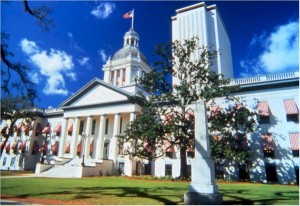The polls had only been closed a few hours Tuesday night, but Sen. Joe Negron already was sending a message on Twitter about the upcoming general elections.
“Next stop November and the Dorothy Hukill and Ellyn Bogdanoff campaigns,” tweeted the Stuart Republican, who is heavily involved in this year’s elections as he tries to build support to become Senate president in 2016.
Negron focused on perhaps the biggest legislative battlegrounds in the November elections. Hukill, a Republican House member from Port Orange, will face Volusia County Council Chairman Frank Bruno, a Democrat, in Senate District 8 in central Florida.
Meanwhile, redistricting has thrown together Bogdanoff, an incumbent Republican senator from Fort Lauderdale, and Sen. Maria Sachs, D-Boca Raton, in District 34 in Broward and Palm Beach counties.
But while Hukill, Bruno, Bogdanoff and Sachs are involved in campaign combat until Nov. 6, dozens of other lawmakers and legislative candidates will be able to take it easier.
After Tuesday’s primaries, it’s almost certain which candidates will win 70 of the 120 House seats this year and at least 13 of the 40 Senate seats. That is based on the numbers of candidates who did not draw any opposition, don’t have general-election opponents after the primaries or only face write-in, no-party or minor-party opposition in November.
The numbers also show Republicans will continue to dominate both chambers. In the House, Republican candidates are already almost certain to win 48 seats, while Democrats have locked up at least 22. Similarly, 11 Senate Republican candidates are virtual shoo-ins, while two Democrats are unopposed.
The biggest remaining questions about Tuesday’s primaries center on three races that could be forced into recounts because of paper-thin margins. In Senate District 27, Rep. Jeff Clemens, D-Lake Worth, led Rep. Mack Bernard, D-West Palm Beach, by 35 votes — out of more than 24,000 cast, according to preliminary results.
Similarly, in House District 107, Rep. Barbara Watson, D-Miami Gardens, led Rep. John Patrick Julien, D-North Miami Beach, by 26 votes out of more than 10,500 cast. Also, in a Republican primary in House District 55 in south-central Florida, Avon Park physician Cary Pigman led former Rep. Randy Johnson by 30 votes out of more than 11,900 cast.
Chris Cate, a spokesman for the Florida Division of Elections, said Wednesday provisional ballots were still being counted, and a decision about holding recounts will be made after unofficial election results are reported to the state by a Friday deadline. State law requires recounts if the margins are less than one-half of 1 percent of the votes cast.
The winners of the Senate District 27 and House District 107 will add to the numbers of locked-up Democratic seats, as they will face only write-in candidates in November.
Even before Tuesday, 40 House and Senate candidates were running unopposed. But the primaries continued thinning the playing field of competitive races, as a mixture of incumbents and non-incumbents got ready to head to Tallahassee.
As an example, Rep. John Legg easily beat two other Republicans in the Senate District 17 primary in Hillsborough and Pasco counties and does not face a general-election opponent. Similarly, in House races, incumbents Matt Caldwell, R-Lehigh Acres; Betty Reed, D-Tampa; Joe Gibbons, D-Hallandale Beach; and Cynthia Stafford, D-Miami, do not face further opposition after winning their primaries.
Newcomers who do not face opposition after the primaries include Ray Rodrigues, an Estero Republican who won in House District 76; Dave Kerner, a Lake Worth Democrat in House District 87; Bobby Powell, a Riviera Beach Democrat who won in House District 88; and David Richardson, a Miami Beach Democrat in House District 113. With his primary win, Richardson likely will become the first openly gay member of the Legislature.
“Last night, Florida Democrats made history: We welcomed seven new Democrats to the state House, including electing the first openly gay state legislator,” state Democratic Chairman Rod Smith said in an e-mail to supporters Wednesday.
In many other districts, meanwhile, Republicans and Democrats will face November opposition only from write-in candidates, no-party candidates or minor-party candidates. Using past elections as a barometer, only Republicans or Democrats typically win legislative races.
In northwest Florida, for instance, that has created a situation where most incumbents likely will waltz back into office in November. Incumbents who are unopposed or do not face major-party opponents include Sen. Don Gaetz, R-Niceville; Sen. Greg Evers, R-Baker; Rep. Clay Ingram, R-Pensacola; Rep. Clay Ford, R-Gulf Breeze; Rep. Doug Broxson, R-Gulf Breeze; Rep. Matt Gaetz, R-Fort Walton Beach; Rep. Marti Coley, R-Marianna; and Rep. Jimmy Patronis, R-Panama City.
But while many candidates are safe in November, party leaders likely will target a relative handful of battleground races. In the House, that could include contests in places such as District 7, where Monticello Republican Halsey Beshears and Bristol Democrat Robert Hill emerged from Tuesday’s primaries, and District 30, where Republican Rep. Scott Plakon of Longwood faces a challenge from Maitland Democrat Karen Castor Dentel.
“Florida Republicans have chosen a strong slate of House candidates committed to the principles of fiscal responsibility, limited government and lower taxes,” said incoming House Speaker Will Weatherford, a Wesley Chapel Republican who is unopposed in November. “As we prepare for the general election, we will continue to make the case to Floridians that Republican leadership remains the best prepared to create the most favorable job creation climate in the nation.”
by Jim Saunders



